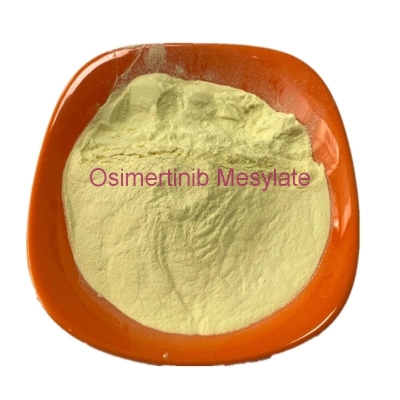-
Categories
-
Pharmaceutical Intermediates
-
Active Pharmaceutical Ingredients
-
Food Additives
- Industrial Coatings
- Agrochemicals
- Dyes and Pigments
- Surfactant
- Flavors and Fragrances
- Chemical Reagents
- Catalyst and Auxiliary
- Natural Products
- Inorganic Chemistry
-
Organic Chemistry
-
Biochemical Engineering
- Analytical Chemistry
- Cosmetic Ingredient
-
Pharmaceutical Intermediates
Promotion
ECHEMI Mall
Wholesale
Weekly Price
Exhibition
News
-
Trade Service
!--," September 22, 2020 // -- Merck and Co recently presented data for key Phase III KEYNOTE-590 trials at the 2020 European Society of Medical Oncology (ESMO) Virtual Conference.
the trial evaluated the first-line treatment of local late stage or metastatic esophageal cancer with anti-PD-1 therapy Keytruda (corinda, generic name: pembrolizumab, Pabliju monoantigen) combined chemotherapy (cisplatin-5-fluorouracil(5-FU)).
results showed that Keytruda plus chemotherapy: (1) significantly increased total lifetime (OS), reduced the risk of death by 27% (HR-0.73; 95% CI:0.62-0.86; p.0.0001) compared to chemotherapy in the entire study group ;( (intentional treatment group, ITT); Significantly improved progression-free survival (PFS), reduced risk of disease progression or death by 35% (HR=0.65; 95% CI: 0.55-0.76; p.0001);(3) significantly improved objective mitigation rate (ORR: 45.0% vs 29.3%).
the study, Keytruda's security is consistent with previous research reports.
esophageal cancer is a devastating malignancy with a high mortality rate and few treatment options other than chemotherapy.
Based on these results, Keytruda is the first anti-PD-1 therapy to show superior OS, PFS, or ORR efficacy compared to current standard chemotherapy, regardless of tumor histology or PD-L1 expression status.
"Esophageal cancer is an invasive disease with a very low survival rate, and progress is urgently needed for newly diagnosed, previously untreated patients," said Dr. Ken Kato, Director of head and neck oncology at Tokyo National Cancer Center Hospital in Japan.
in the KEYNOTE-590 trial, the risk of death was reduced by 27%, and the results showed that Keytruda had the potential to change the current treatment model for patients with locally advanced, non-removable or metastatic esophageal or esophageal gastric junction cancer.
results also showed that the average total survival of the Keytruda group was 12.4 months, while that of the chemotherapy group was 9.8 months. Dr Roy Baynes, Senior Vice President and Head of Global Clinical Development and Chief Medical Officer, Mercedon Research Laboratory,
, said: "These findings are particularly impressive given the improvement in overall survival observed in all patient groups, including patients with esophageal squamous cell carcinoma, adenocarcinoma and gastroesophageal junction tumors, regardless of PD-L1 expression status.
our goal is to extend the lifespan of cancer patients, and these important findings add a new level of data to Keytruda's survival data for multiple cancers.
" Mercadon will share the data with regulators around the world.
currently, Keytruda has been approved in the United States, China, and Japan as a single-drug therapy for patients with relapsed localized advanced or metastatic esophageal squamous cell carcinoma with a second-line treatment tumor expression PD-L1 (combined positive score (CPS) of 10).
, through its extensive clinical program, is continuing to study Keytruda's therapeutic potential in multiple environments and stages of gastrointestinal cancer, including stomach, liver and bile, esophageal, pancreatic, colorectal and cancers.
esophageal cancer (Photo: medindia.net) KEYNOTE-590 is a randomized, double-blind Phase III trial (NCT03189719) with 749 cases of local advanced or metastatic esophageal cancer (including esophageal adenocarcinoma and esophageal squamous cell carcinoma (ESCC)) and esophageal gastric junction (GEJ) Siewert Type 1 adenocarcinoma patients.
, these patients were randomly assigned to receive Keytruda plus chemotherapy, placebo plus chemotherapy as first-line therapies.
end points of this study are OS and PFS, and secondary endpoints include ORR, mitigation duration (DOR), and security.
OS data: At the first interim analysis, the medium follow-up was 10.8 months, compared to placebo, and Keytruda plus chemotherapy was randomized in all patients (medium OS: 12.4 months vs. 9.8 months; HR:0.73( 95% CI: 0.62-) ESCC patients ;p0.86) ;p0.0001), tumor expression PD-L1 (CPS-10) (medium OS: 13.9 months vs 8.8 months; HR=0.57 (95% CI:0.) 43-0.75;p0.0001), ESCC patients (medium OS: 12.6 months vs 9.8 months; HR=0.72 (95% CI:0.60-0.88) ;p ;p patients with a tumor expression PD-L1 (CPS=10) (medium OS: 13.5 months vs 9.4 months; HR=0.62 (95% CI:0.49-0.78) ;p OS results in the 0.0001).
PFS data: Keytruda plus chemotherapy in all randomized patients compared to placebo (medium PFS: 6.3 months vs 5.8 months; HR=0.65 (95% CI:0.d) 55-0.76;p.lt;0.0001), ESCC patients (medium PFS: 6.3 months vs 5.8 months; HR-0.65 %CI: 0.54-0.78) patients with ;p-lt;0.0001), tumor expression PD-L1 (CPS-10) (medium PFS: 7.5 months vs 5 .5 months;HR=0.51 (95%CI:0.41-0.65);p<0.0001) showed significantly better PFS results.
ORR and DOR data: Keytruda plus chemotherapy showed better ORR data (45.0% vs. 29.3% ;p.0001) and DOR data (medium DOR: 8.3 months vs 6.0 months) compared to placebo.
!--/ewebeditor:page--!--ewebeditor:page title="--safety: Treatment-related adverse events (TRAE) resulted in the suspension of 19.5% of patients in the Keytruda plus chemotherapy group and 11.6% of the patients in the chemotherapy group.
71.9% of patients in the Keytruda plus chemotherapy group and 67.6% of patients in the chemotherapy group had level 3 to 5 TRAE.
9 cases in the Keytruda plus chemotherapy group and 5 treatment-related deaths in the chemotherapy group.
-mediated adverse events at any level occurred in 25.7 percent of patients in the Keytruda plus chemotherapy group and 11.6 percent in the chemotherapy group.
esophageal cancer is a particularly difficult cancer to treat, starting from the inner esophageal layer (mucous membranes) to grow outwards.
there are two main types of esophageal cancer: squamous cell carcinoma and adenocarcinoma.
, esophageal cancer is the seventh most commonly diagnosed cancer and the sixth most common cause of death.
estimates that in 2018, there will be more than 572,000 new cases of esophageal cancer worldwide and nearly 509,000 deaths.
the United States, 185,000 new cases of esophageal cancer will be diagnosed and 16,000 people will die from the disease by 2020.
, esophageal cancer is the fifth most common cancer and the fourth most common cause of death, with 90% of esophageal cancers being squamous cell carcinomas.
is a PD-(L)1 tumor immunotherapy that helps detect and fight tumor cells by improving the body's immune system.
Keytruda is an anthogeneic monoclonal antibody that blocks the interaction between PD-1 and its mediators PD-L1 and PD-L2, activating T lymphocytes that may affect tumor cells and healthy cells.
To date, more than 10 PD-(L)1 oncology immunotherapys have been approved worldwide, and Keytruda is a leader in this field, with more than 20 therapeutic adaptations approved, with global sales of $11.1 billion in 2019, up 58% from the previous year.
has the largest clinical development program in the industry for immuno-oncology, and more than 1,200 clinical trials are currently investigating Keytruda's role in multiple types of tumors and treatment backgrounds.
Keytruda Clinical Program aims to understand the role of the drug in cancer and the factors that may predict patients to benefit from Keytruda treatment, including exploring several different biomarkers.
() Original origin: Merck's KEYTRUDA® Plus Processy Reduced Risk of Death by 27% Versus Technology as First-Line Treatment for Locally Advanced or Metasted !--/ewebeditor:page







